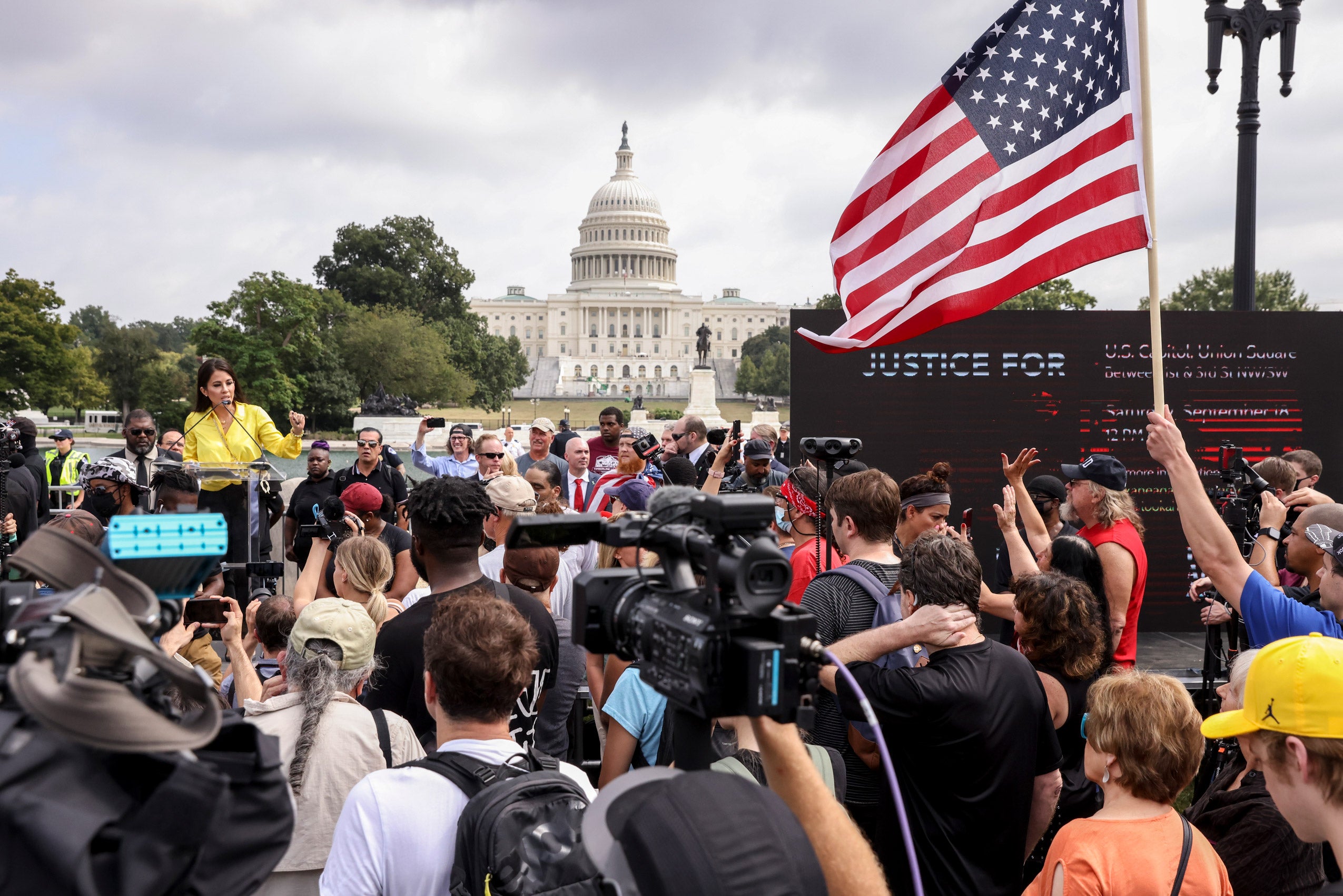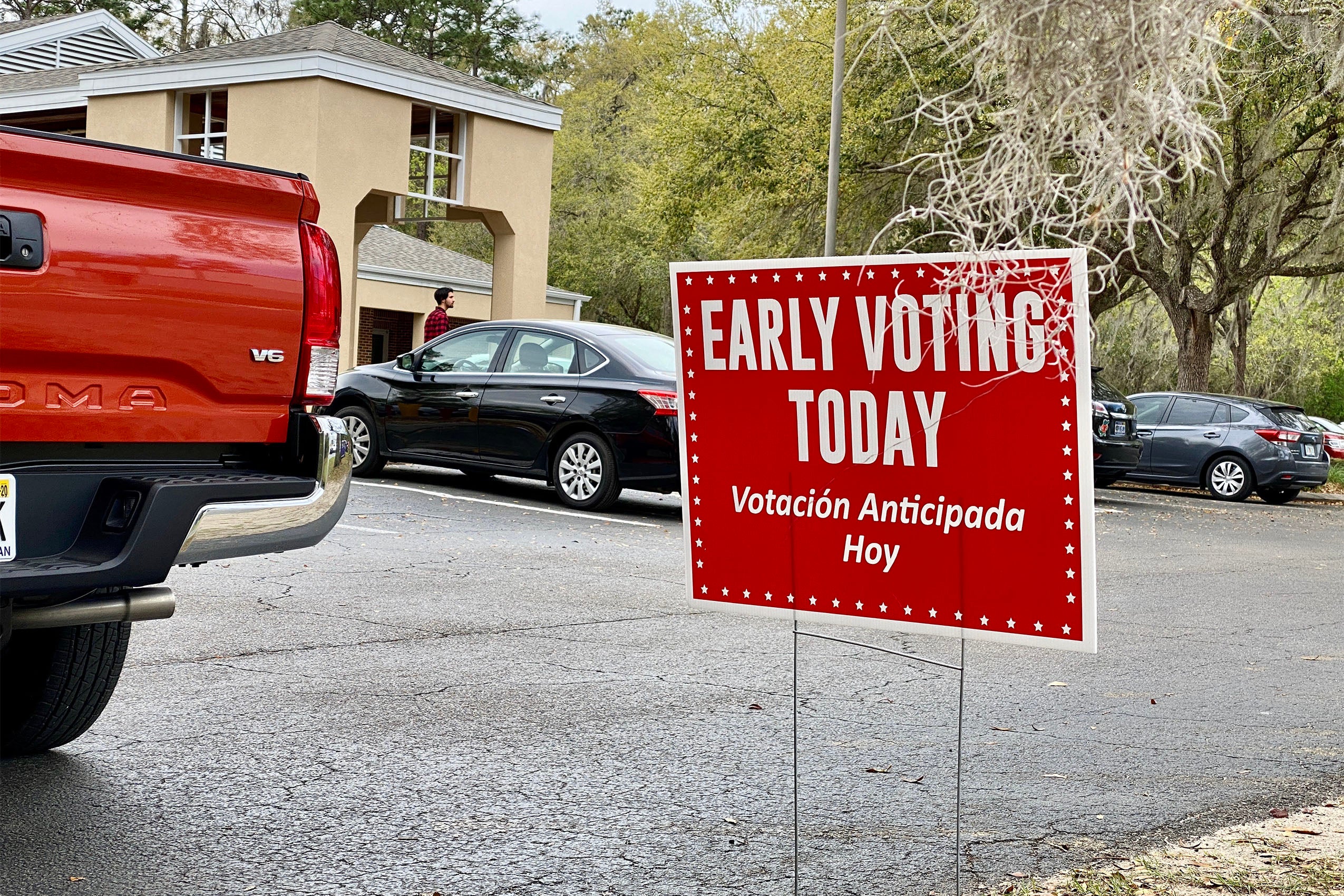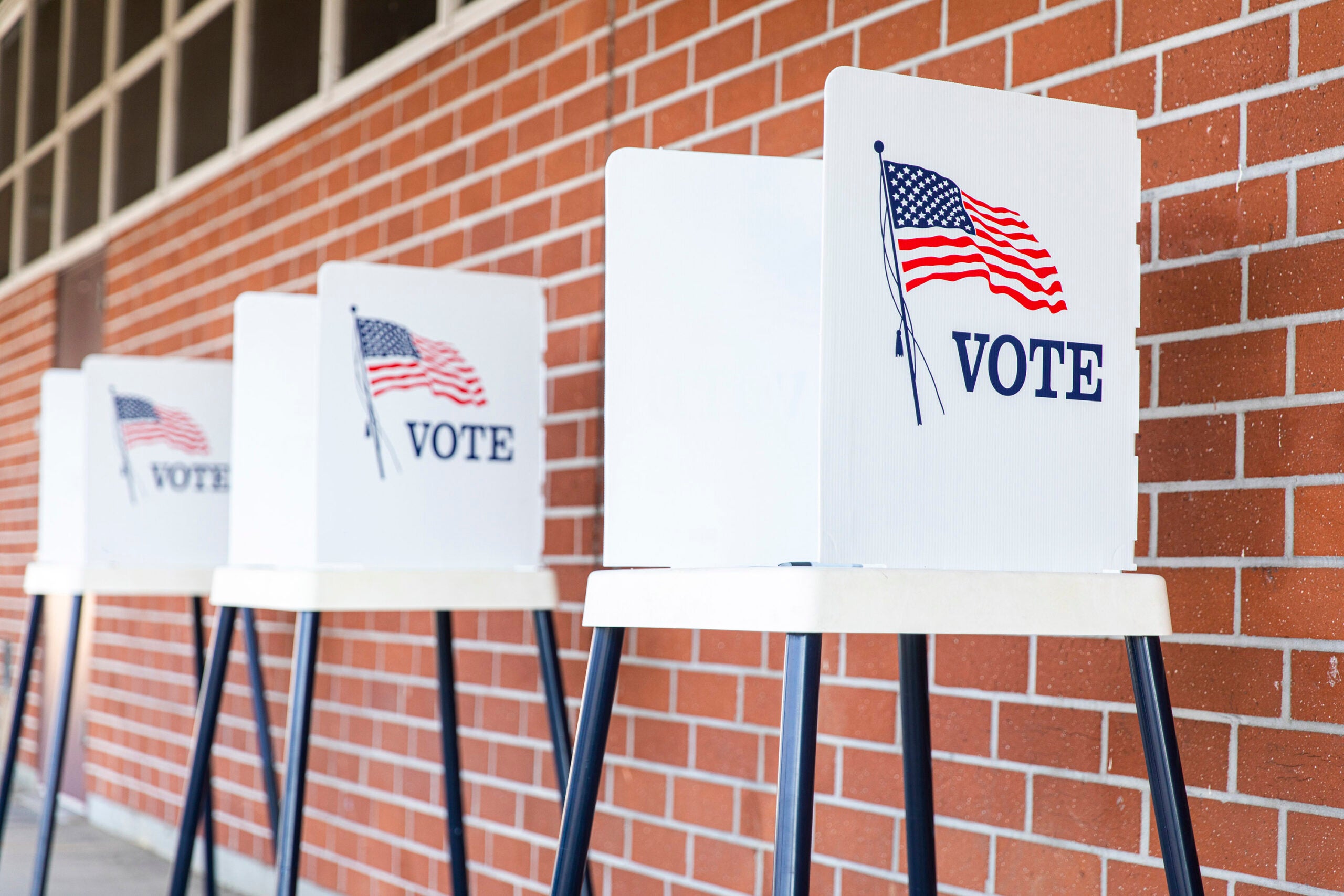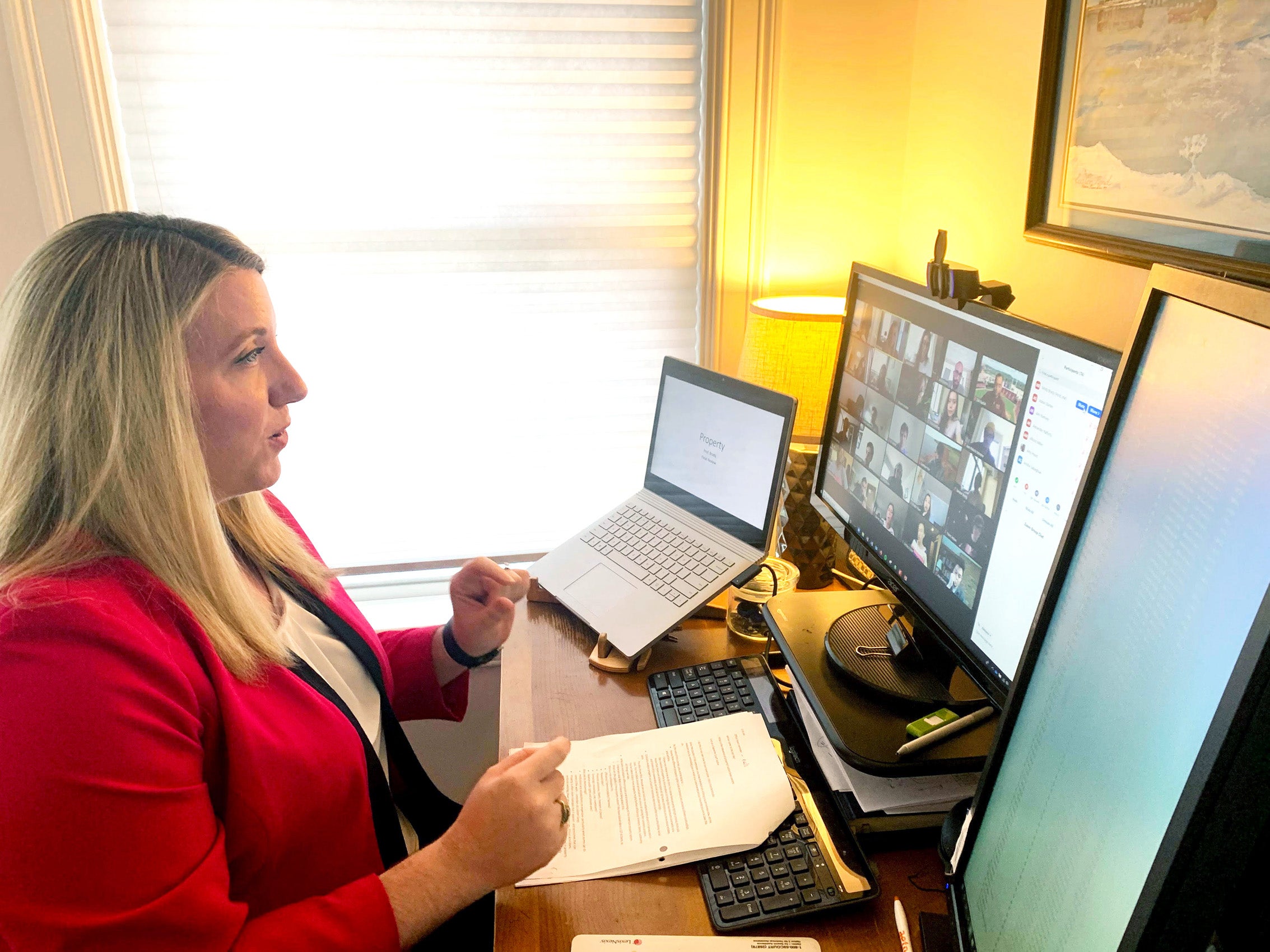People
Nicholas Stephanopoulos
-
How Manchin and Sinema Completed a Conservative Vision
January 18, 2022
The decision by Senators Kyrsten Sinema and Joe Manchin to block their fellow Democrats from passing new federal voting-rights legislation clears the path for years of tightening ballot restrictions in Republican-controlled states. It also marks a resounding triumph for Chief Justice John Roberts in his four-decade quest to roll back the federal government’s role in protecting voter rights. ... “There’s no consistent explanation that can account for Roberts’s rulings in election-law cases other than just a partisan motive,” [Nicholas] Stephanopoulos, echoing the view of many critics, told me. “Intervene when it’s restrictions on money in politics; don’t intervene when it’s partisan gerrymandering or voting restrictions. Intervene again when it’s Congress trying to do something about racial vote suppression or racial vote dilution. Sometimes mention the Framers, sometimes don’t mention the Framers. It’s anything goes as long as the final outcome is the preferred partisan outcome.”
-
You Can’t Judge a District Just by Looking at It
January 11, 2022
Over the past two centuries, the quickest way to spot a gerrymandered map of congressional districts has been to look at their shapes. Distended, jagged, almost laughably contorted boundaries were usually a sign that mapmakers were trying to tip the scales toward one political party or the other. ... One way to stymie partisan gerrymandering is by putting redistricting in the hands of commissions that include Democrats and Republicans. “You can pick half a dozen different parameters, and on every single one of them, you're seeing progress in states that have independent commissions,” said Nicholas Stephanopoulos, a law professor at Harvard University. Independent commissions aren’t a panacea. In some states, legislators have all but ignored the decisions of poorly structured panels. But when designed carefully, the commissions are a significant improvement over the status quo. Democrats in the House have proposed mandating independent commissions in their voting rights bill, the For the People Act. But Republicans have blocked the legislation in the Senate. “With the politicians, once they’re pursuing their self-interests, everything else goes out the window,” Mr. Stephanopoulos said.
-
Why Democrats Keep Bringing Up Voting Rights
January 10, 2022
...Last week, Democrats announced they would bring voting rights to the fore once again. Seemingly energized by the first anniversary of the Jan. 6 insurrection on the U.S. Capitol, when supporters of then-President Donald Trump tried to prevent the certification of the results of the 2020 presidential election, Senate Majority Leader Chuck Schumer said his chamber would soon vote on easing filibuster rules so that voting rights legislation could possibly — finally — make it across the finish line. ... But even if Democrats aren’t able to pass voting rights legislation, they can at least establish themselves as the party in favor of democracy and voting rights. The question is, will this be enough for their base? At least one expert told me that the party risks looking feckless, if not useless, if they cannot deliver. “You don’t get points for trying; you get points for succeeding,” said Nicholas Stephanopoulos, a professor of law at Harvard Law School. “So the party base who cares about voting rights as an issue are not going to care that Democrats tried and failed. If anything, they’ll be irritated and disappointed if the bill has a lot of salience and still doesn’t pass.”
-
January 6, 2021: Harvard Law experts reflect a year later
January 4, 2022
Harvard Law Today asked experts from across Harvard Law School to share their perspectives on January 6, 2021, the events that have unfolded since, and the implications for American democracy going forward.
-
With just over a week left until Michigan's redistricting commission votes to adopt new voting districts for the next decade, the state’s civil rights department says the commission's maps violate federal voting rights requirements. ... An analysis by the department argues the commission's proposed congressional maps don't comply with the Voting Rights Act — the federal law that prohibits voting districts that deny minority voters an opportunity to elect their preferred candidates — because they eliminate majority-minority districts, where nonwhite voters make up more than 50% of the district. It found that the commission must draw majority-minority districts in Detroit, Flint, Hamtramck, Inkster, Pontiac, Redford, Saginaw, Southfield and Taylor. Nicholas Stephanopoulos, a Harvard Law School professor who specializes in election law, called the department's work "laughably bad analysis," in an email to the Free Press. The Voting Rights Act doesn't require majority-minority districts, Stephanopoulos said. "Rather, it sometimes requires minority opportunity districts to be drawn — that is, districts where minority voters are able to elect their candidates of choice. In a state like Michigan, with a reasonable volume of white Democrats willing to support minority-preferred candidates, the threshold for an opportunity district is certainly below 50%."
-
Critics of Maryland’s congressional redistricting are promising lawsuits. Legal experts say they face an uphill battle
December 13, 2021
Critics of Maryland’s newly redrawn congressional maps promised to once again file lawsuits to block the reconfigured electoral districts, which Republicans blasted as a blatant partisan power grab by Democrats. But fighting partisan gerrymandering in the courts now appears even more difficult than a decade ago, when opponents fought a losing battle against Maryland’s last redistricting plan. ... “With a Democratic legislature that has a veto-proof majority, they could easily fix any (Voting Rights Act) problem or any racial gerrymandering problem without drawing additional Republican districts,” said Nicholas Stephanopoulos, a Harvard Law School professor who’s been involved in lawsuits over partisan gerrymandering. “If Republicans sue, all you can really manage is to potentially reshuffle the districts racially but without affecting their partisan breakdown.”
-
Michigan redistricting commission to weigh input from Black voters
October 27, 2021
Michigan’s redistricting commission will soon decide whether it wants to heed the calls it heard during its statewide tour to make wholesale changes to how it drew Black voters in its draft congressional and legislative districts. Some of the loudest criticism the commission received targeted the draft districts it drew in Detroit that would pair predominantly Black neighborhoods in the city with whiter suburban communities. ... Voting rights experts say there is no target share of minority voters that should be assigned to a district to comply with the Voting Rights Act, and creating a racial target would expose the commission to legal challenges. ... And the commission is not beholden to how the current lines divvy up minority voters, said Nicholas Stephanopoulos, a Harvard Law School professor who specializes in election law. The Voting Rights Act "doesn't require 50% districts, it doesn't require freezing the status quo. It requires performing districts for minority voters," he said.
-
After Senate Republicans Block Voting Rights Legislation, the Filibuster Is Back in the Crosshairs
October 22, 2021
President Joe Biden said on Thursday he would be open to doing away with the filibuster in pursuit of protecting Americans’ voting rights, bolstering voting rights’ advocates calls to abolish the controversial rule after Republicans blocked federal voting legislation from advancing for the third time this year. Wednesday’s 49-51 Senate vote barred any debate from occurring on the Freedom to Vote Act, a bill that would have enacted automatic voter registration, guaranteed at least 15 consecutive days of early in-person voting and allowed for no-excuse mail voting in federal elections among other measures. ... “This is further confirmation that paring down the bill isn’t going to make a difference,” says Nicholas Stephanopoulos, a professor at Harvard Law School who specializes in election law. “[Democrats] haven’t come close to getting the vote of a single Republican Senator—let alone 10 Republican senators—so we’re nowhere near anything like a 60-vote supermajority.”
-
Math Quants Could Disrupt Process That Sways Power in Washington
October 18, 2021
State judges bedeviled by weirdly shaped and obviously partisan congressional district maps can now get expert help from an unusual source: math nerds. Using sophisticated techniques drawn from statistics and geometry, mathematicians have developed tools that could play a huge role in a gerrymandering lawsuit filed in Ohio and during court fights expected in Georgia, Texas and Oregon. The algorithms can determine whether a map benefits one party or another, with the aim of providing courts and citizens with an objective gauge rather than relying on partisan arguments. While both mapmakers and their critics have long used software to draw the lines, this year will be the first redistricting cycle in which opponents will have the mathematical measures to objectively show that a map is gerrymandered as the maps are being approved for the next decade. That could potentially alter a process that may determine control of the U.S. House in next year’s midterms..In 2014, Harvard law professor Nicholas Stephanopoulos and political scientist Eric McGhee developed the efficiency gap, which measures how many votes each party wasted, either by losing a race or winning by an unnecessarily high margin.
-
Is democracy in peril?
September 23, 2021
The state of American democracy will be examined in a lecture series, "Democracy," which had its first session this week and will continue through the fall and spring.
-
Pay People to Vote
August 10, 2021
An op-ed by Jonathan S. Gould and Nicholas Stephanopoulos: Democracy in America is under attack. Red states are churning out laws that make it harder to vote and easier for partisans to subvert elections. A round of ruthless gerrymandering is set to begin later this year. The influence of money in politics is greater than ever. A pair of congressional bills—the For the People Act and the John Lewis Voting Rights Advancement Act—would tackle these challenges head-on, but they are stuck as long as the filibuster remains in place. And the filibuster doesn’t seem to be going anywhere.
-
Harvard Law Professor Nicholas Stephanopoulos recently spoke with Harvard Law Today about the Supreme Court's recent decision in Brnovich v. Democratic National Committee, options for advocates moving forward, and the future of the Voting Rights Act.
-
This year’s wave of new voting restrictions across the South may seem a response to the 2020 election, but its origins stem in no small part from the Supreme Court, which over the last decade has reshaped election law to elevate the power of state lawmakers over the rights of their voters. ... Harvard Law Professor Nicholas Stephanopoulos, who teaches election law, said he wouldn’t speculate about the intent of the justices. “But across the right to vote, redistricting, the Voting Rights Act and campaign finance, the court’s decisions have benefited Republicans,” he said. “And partisan advantage explains these decisions better than rival hypotheses like originalism, precedent, or judicial nonintervention.”
-
The For the People Act’s Missing Piece
May 10, 2021
An op-ed by Nicholas Stephanopoulos: Georgia has been on the country’s mind lately. And not for a good reason. In March, the state passed one of the most sweeping sets of voting restrictions in recent memory. Among other things, SB 202 bars absentee ballot applications from being sent to all voters. It imposes an ID requirement for absentee voting. It slashes the number of ballot drop-off boxes in Georgia’s biggest counties. It forbids mobile voting centers. It stops ballots cast in the wrong precinct from being counted. It criminalizes offering food or water to voters waiting in line. It gives the legislature control over the State Elections Board. It authorizes that Board to suspend county election officials. And so on. For many voting rights advocates, the solution to laws like Georgia’s is clear: Congress should pass the For the People Act, the omnibus electoral reform bill recently approved by the House. And it’s true, the Act would override several of Georgia’s new limits. For example, the Act would mandate that absentee ballot applications be sent to all eligible voters. The Act would also prohibit ID requirements for absentee voting. And the Act would compel about five times more drop-off boxes than are allowed under Georgia’s law.
-
If the sweeping voting rights bill that the House passed in March overcomes substantial hurdles in the Senate to become law, it would reshape American elections and represent a triumph for Democrats eager to combat the wave of election restrictions moving through Republican-controlled state legislatures. But passage of the bill, known as H.R. 1, would end a legislative fight and start a legal war that could dwarf the court challenges aimed at the Affordable Care Act over the past decade. “I have no doubt that if H.R. 1 passes, we’re going to have a dozen major Supreme Court cases on different pieces of it,” said Nicholas Stephanopoulos, a law professor at Harvard...Even if every one of the objections to the bill discussed in this article were to prevail in court, most of the law would survive. “Part of why the attack on H.R. 1 is unlikely to be successful in the end is that the law is not a single coherent structure the way Obamacare was,” Professor Stephanopoulos said. “It’s a hundred different proposals, all packaged together.” “The Roberts court would dislike on policy grounds almost the entire law,” he added. “But I think even this court would end up upholding most — big, big swaths — of the law. It would still leave the most important election bill in American history intact even after the court took its pound of flesh.”
-
Election Law Clinic launches at Harvard Law School
April 7, 2021
Harvard Law School has announced the launch the new Election Law Clinic, which will give students the opportunity to work on a broad range of cutting-edge issues in areas such as redistricting, voting rights, campaign finance, and party regulation.
-
The Fate of Biden’s Agenda Hangs in the Balance
March 31, 2021
Every 10 years, after the collection of census data, states are required to redraw the boundaries of their congressional districts to ensure that they remain equal in population. The process — as readers of this newspaper know — is vulnerable to gerrymandering, in which districts are redrawn to give favored parties, office holders or constituencies an advantage in elections...As states await census data to guide redistricting, there is one wild card in the mix: the possible enactment of voting rights reform, HR 1 or the For the People Act of 2021 — the measure that passed the House on March 3 on a 220-210 vote, but faces the threat of a filibuster in the Senate. I asked Nicholas Stephanopoulos, a law professor at Harvard whose specialties include election law, about the bill. He emailed me to say that: “The voting legislation currently before Congress would revolutionize the redistricting process if it passed. It would require all states to use truly independent commissions, effective immediately. Separate from this structural reform, the bill would also include quantitative partisan bias thresholds that maps wouldn’t be allowed to exceed. These thresholds would have real teeth.” At the same time, Stephanopoulos continued, the legislation would put the brakes on voter suppression laws: “The bill affirmatively requires a series of participation-enhancing policies for congressional elections: automatic voter registration, same-day voter registration, at least 15 days of early voting, expanded mail-in voting, restrictions on voter purges, restrictions on photo ID requirements, etc.”
-
Next front in gerrymandering wars will be whom to count
February 24, 2021
An op-ed by Jowei Chen and Nicholas Stephanopoulos: The gerrymandering wars are about to resume. Over the next year, every state in the country will have to redraw its congressional and legislative districts. In anticipation of redistricting, Republicans are eyeing a new tactic: For decades, states have equalized the numbers of people their districts contain. But the GOP is now pushing to equalize districts’ citizen voting-age populations instead. Under this approach, noncitizens and children would be invisible for remapping purposes. Only adult citizens would count. Republicans think that by omitting non-adult citizens from districts’ populations, they would slash the representation of minorities and Democrats. Their logic goes like this: At present, many districts with non-White or Democratic legislators have relatively low proportions of adult citizens. So these districts would have to grow in size — and shrink in number — to acquire enough adult citizens to hit their new population targets. Conversely, many districts with White or Republican legislators have higher shares of adult citizens. These districts would shed some of their residents into adjacent districts in a world where adult citizens, not people, had to be equalized. These dispersed voters would tilt their new districts in a conservative direction.
-
Republican Efforts to Restrict Voting Risk Backfiring on Party
February 16, 2021
Republican lawmakers in battleground states are rushing to enact stricter voting laws that Democrats worry could dampen Black and Hispanic turnout, but the moves could end up backfiring because of the changing face of the GOP coalition. The flurry of legislation includes attempts to impose voter ID requirements and roll back pandemic-related expansion to mail-in access, steps that may inadvertently limit the participation of many of the older, rural and blue-collar voters that Republicans now depend on. State legislatures across the country are considering more than a hundred bills that would increase voter ID requirements, tighten no-excuse vote-by-mail, and ban ballot drop boxes, among other changes...This flood of legislation comes despite research showing that voter ID laws passed over the last decade not only don’t hamper minority turnout, but may even boost it by motivating angry Democrats and spurring stronger get-out-the-vote efforts. Nick Stephanopoulos, a Harvard professor who studies voting laws, said that the suburban, college-educated voters moving toward the Democratic Party are the least likely to be affected by new restrictions, since they have the resources to overcome them and tend to be regular voters already.
-
Laying the groundwork for real-life lawyering
January 7, 2021
Students in independent clinicals are making the most of a digital world.





